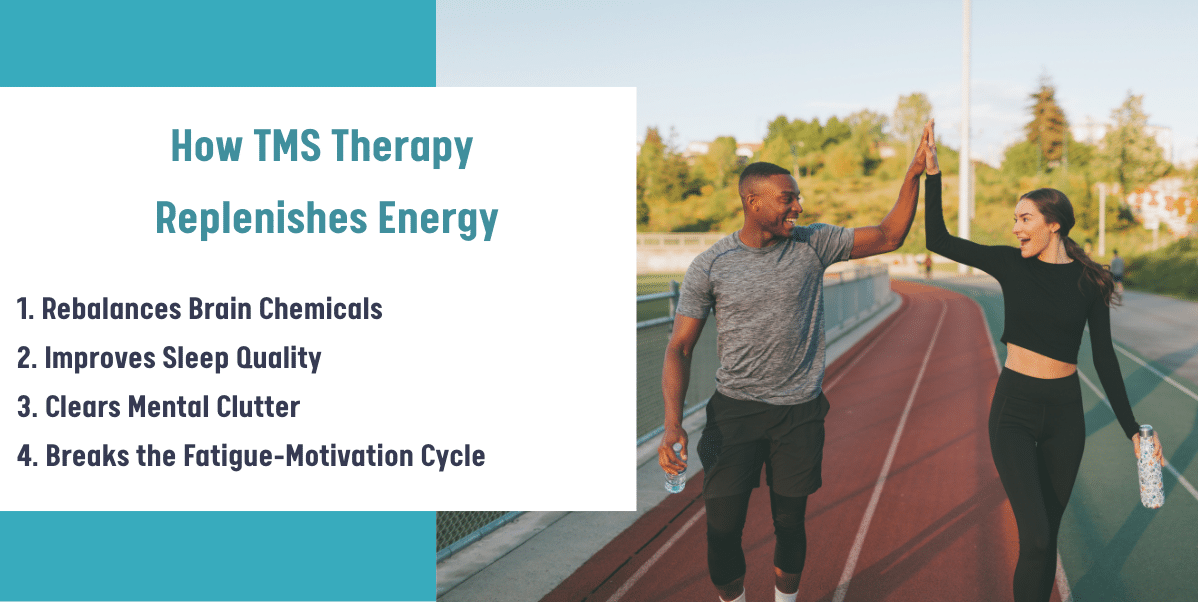Feeling drained, sluggish, or mentally foggy even after a full night’s sleep? You’re not alone. Did you know TMS Therapy can boost your energy and fight fatigue? Many people live with daily fatigue, especially when coping with depression, anxiety, or high-functioning mental health disorders. It’s more than being tired—this type of fatigue drains your motivation, focus, and ability to function.
But there is hope. TMS therapy for energy and fatigue, an FDA-cleared and non-invasive treatment, is helping individuals feel re-energized, mentally sharp, and emotionally balanced—without medication.
Understanding the Connection Between Fatigue and Mental Health
Fatigue isn’t always caused by lack of sleep. Often, it has deeper psychological roots. People with depression commonly report constant tiredness, even when they rest. Similarly, anxiety consumes mental energy and leaves you feeling physically worn down.
This happens because both depression and anxiety disrupt the brain’s balance of neurotransmitters—like serotonin, dopamine, and norepinephrine. These are the same chemicals that regulate mood and energy. In fact, depression can physically drain the brain’s ability to manage these chemicals, leaving you mentally foggy and unmotivated despite rest.
The Science Behind TMS Therapy
TMS therapy is supported by research and has been shown to relieve depression and related symptoms like fatigue. According to Harvard Medical School, this therapy is effective for people who haven’t responded to medications.
TMS works by sending magnetic pulses to specific areas of the brain, especially the prefrontal cortex. This part of the brain plays a major role in mood and decision-making. The pulses help improve communication between brain cells.
As a result, patients often notice better mental clarity, improved mood, and increased energy. And unlike medications, TMS doesn’t cause side effects like drowsiness or lethargy.
How TMS Therapy Replenishes Energy
1. Rebalances Brain Chemicals
TMS therapy helps restore proper levels of serotonin, dopamine, and norepinephrine. These chemicals are key to feeling motivated and energized throughout the day.
2. Improves Sleep Quality
Better sleep is a common benefit of TMS. With more restful, uninterrupted sleep, your body and brain have time to recharge. This alone can boost daily energy levels.
3. Clears Mental Clutter
Anxiety and depression can overload your thoughts. TMS reduces overactivity in certain brain regions, helping quiet the mind and improve focus.
4. Breaks the Fatigue-Motivation Cycle
When you’re exhausted, it’s hard to get motivated. And when you’re unmotivated, it’s easy to feel even more tired. TMS helps interrupt this cycle by improving your baseline mental health.
TMS and High-Functioning Depression: The Hidden Strain
Some people function well on the outside but struggle quietly with internal exhaustion. This is often called high-functioning depression. You might keep up with responsibilities while hiding self-criticism, sadness, and emotional fatigue.
TMS therapy supports individuals with high-functioning depression by replenishing the emotional energy lost through constant mental effort. Often, quick depression spurs—those brief emotional dips—build up over time and evolve into chronic emotional burnout.
How to Maximize the Energy-Boosting Benefits of TMS
TMS can work even better when paired with simple daily habits. Try these tips during your treatment:
-
Stay Consistent with Sessions: Follow your provider’s schedule. Skipping sessions may slow your progress.
-
Prioritize Sleep Hygiene: Use the improvements you feel to set a healthy sleep schedule. Stick to regular sleep and wake times.
-
Add Light Physical Activity: Low-impact activities like walking or stretching can increase endorphins and boost energy.
-
Practice Mindfulness: Daily breathing exercises, yoga, or short meditations help calm your mind and extend the benefits of TMS.
-
Eat Well and Stay Hydrated: Balanced meals and plenty of water support brain function and energy throughout the day.
FAQs About TMS Therapy and Energy Levels
1. How soon will I feel more energized after starting TMS therapy?
Most people notice improvements within 2 to 4 weeks. However, results vary, and your provider will track your progress.
2. Can TMS replace antidepressants for managing fatigue?
Yes, for many people. TMS is especially helpful for those who don’t tolerate medication well. Always consult your provider before making changes.
3. Is TMS safe for people with chronic fatigue?
Yes. TMS is FDA-cleared and considered safe, especially for fatigue tied to anxiety or depression.
4. Does TMS cause side effects that affect energy?
The most common side effect is mild scalp discomfort. Unlike medications, TMS doesn’t cause fatigue or drowsiness.
5. How long do the effects of TMS last?
Many patients enjoy long-term benefits. Some may need maintenance sessions to stay balanced and energized.
Take the First Step Toward Renewed Energy
If you’re feeling worn down, stuck, or mentally foggy—TMS therapy may be the answer. It’s time to feel like yourself again.
Schedule Your Complimentary TMS Screening Today
At My TMS Therapy, we’re here to help you restore your energy and joy. Our compassionate team will guide you through every step of the process.
Call us at (877) 548-8081 or contact us online to book your screening today.



